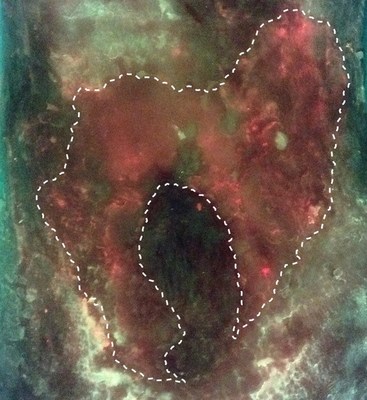MolecuLight Inc. announced the publication in International Wound Journal1 of an independent prospective observational study examining the impact of incorporating fluorescence imaging into standard care for the diagnosis and management of wound-related cellulitis.
Published results describe use of point-of-care imaging for the early detection and proactive management of wound-related cellulitis
TORONTO, Oct. 12, 2021 /PRNewswire/ - MolecuLight Inc., the leader in point-of-care fluorescence imaging for real-time detection of wounds containing elevated bacterial loads, announced the publication in International Wound Journal1 of an independent prospective observational study examining the impact of incorporating fluorescence imaging into standard care for the diagnosis and management of wound-related cellulitis. Dr. Charles Andersen, a surgeon at the Madigan Army Medical Center, led this study on wound-related cellulitis, defined as an invasion of bacteria from chronic wounds into the adjacent dermis.
The publication, "Diagnosis and Treatment of the Invasive Extension of Bacteria (Cellulitis) from Chronic Wounds Utilizing Point-of-Care Fluorescence Imaging", included 236 patients visiting Madigan's outpatient wound care center over a 16-month period between January 2020 and April 2021. In the study, wound-related cellulitis was diagnosed in 6.4% (15/236) of patients. Consistent among all patients diagnosed with wound-related cellulitis was an irregular pattern of red (bacterial) fluorescence visualized on the MolecuLight i:X point-of-care imaging system that extended beyond the wound bed and periwound. This unique pattern of red fluorescence could not be removed through cleansing or debridement.
Cellulitis is a serious clinical condition, accounting for 10% of all infectious disease-related US hospitalizations2 and up to $3.7 billion in costs annually 3. Cellulitis can lead to serious complications including bacteremia, necrotizing fasciitis, endocarditis, or shock4,3. Severe cellulitis in patients with other comorbid conditions may result in death. Timely and accurate diagnosis of cellulitis is notoriously challenging due to a lack of gold standard diagnostic techniques and a similar clinical presentation as other inflammatory conditions (e.g., stasis dermatitis). In those patients misdiagnosed, 85% experience avoidable hospital admission and 92% receive unnecessary antibiotics5.
"The results of this study show how MolecuLight point-of-care imaging presents an intriguing solution to revealing extension of bacteria into tissue, reducing misdiagnosis of wound-associated cellulitis, and enabling more proactive early treatment, particularly in patients lacking obvious symptoms", says Dr. Charles A. Andersen, Chief, Vascular/ Endovascular and Limb Preservation Surgery Service (Emeritus), Chief Wound Care Service and Medical Director Wound Care Clinic at Madigan Army Medical Center, Tacoma, WA. "Given that at least 30% of cellulitis cases are misdiagnosed,6,5 the addition of consistent and objective information provided by fluorescence scans can significantly reduce the uncertainty associated with diagnosis of wound-related cellulitis. In addition, the use of fluorescence imaging to support earlier detection and proactive management of wound-related cellulitis can limit progression of infection and avoid the need for intravenous antibiotics and the high costs associated with inpatient admission".
An example case of wound-related cellulitis from the study is shown (above) where the wound does not appear to have cellulitis or elevated bacterial burden upon assessment with standard-of-care clinical signs and symptoms (left). In contrast, when imaged with the MolecuLight i:X (right), an irregular pattern of red (bacterial) fluorescence extending beyond the wound bed and periwound is visible, and could not be removed with vigorous cleansing, indicating that the bacteria are located subsurface. This pattern of red fluorescence, demonstrating invasive extension of bacteria into surrounding tissues, was consistent in all wounds in the study where wound-related cellulitis was diagnosed.
Dr. Andersen will present the findings of this publication in a talk titled, "Diagnosis and Treatment of the Invasive Extension of Bacteria (Cellulitis) from Chronic Wounds Utilizing Point-of-Care Fluorescence Imaging" at the upcoming clinical conference, SAWC (Symposium on Advanced Wound Care) Fall 2021 on Sunday, October 31, 2021 at 9:00 am at Caesars Palace in Las Vegas, Nevada.
|
References |
|
|
1 |
Andersen, C.A. et al, "Diagnosis and Treatment of the Invasive Extension of Bacteria (Cellulitis) from Chronic Wounds Utilizing Point-of-Care Fluorescence Imaging", International Wound Journal 2021: 1-13 |
|
2 |
Lazzarini L et al, J Infect. 2005;51(5):383-389. |
|
3 |
Raff AB et al, JAMA. 2016;316(3): 325-337. |
|
4 |
Pasternack MS. Mandell, Douglas, & Bennett's Principles & Practice of Infectious Diseases. Vol 1; Phil., PA: Churchill Livingstone/Elsevier; 2010:1289-1312. |
|
5 |
Weng QY et al, JAMA Dermatol. 2017;153(2):141-146. |
|
6 |
Levell NJ et al, Br J Dermatol. 2011;164(6):1326-1328. |
About MolecuLight Inc.
MolecuLight Inc., a privately-owned medical imaging company that has developed and is commercializing its proprietary fluorescent imaging platform technology in multiple clinical markets. MolecuLight's first commercially released device, the MolecuLight i:X fluorescence imaging system and its accessories provide a point-of-care handheld imaging device for the global wound care market for the detection of wounds containing elevated bacterial burden (when used with clinical signs and symptoms) and for digital wound measurement. The company is also commercializing its unique fluorescence imaging platform technology for other markets with globally relevant, unmet needs including food safety, consumer cosmetics and other key industrial markets.
Image:
Download at: https://moleculight.box.com/s/oab22c1vi8ud1j8oymylbfogp2lg12bk
![]() View original content to download multimedia:https://www.prnewswire.com/news-releases/study-of-236-patients-reveals-utility-of-moleculight-ix-in-detection-and-management-of-wound-related-cellulitis-301396564.html
View original content to download multimedia:https://www.prnewswire.com/news-releases/study-of-236-patients-reveals-utility-of-moleculight-ix-in-detection-and-management-of-wound-related-cellulitis-301396564.html
SOURCE MolecuLight





